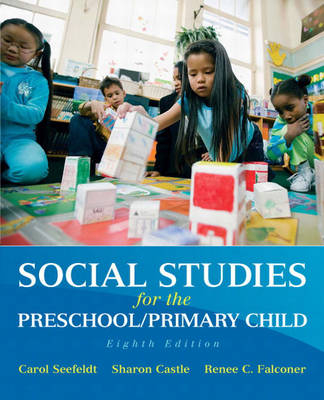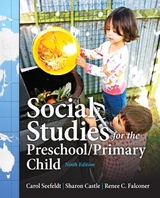
Social Studies for the Preschool/Primary Child
Pearson (Verlag)
978-0-13-715284-1 (ISBN)
- Titel erscheint in neuer Auflage
- Artikel merken
This popular text provides a multitude of practical ideas, suggestions, and activities that prospective early childhood teachers can use to both interest young children in social studies and integrate social studies with other sciences, art, literature, mathematics, reading, and writing. Because play is the basic means of young children's learning, the text offers a full chapter on the topic and incorporates ideas for “playing” throughout the material. TThis edition includes three new chapters to offer all of the 10 NCSS Thematic Strands. In addition, there is a new emphasis on the use of such technology as e-mail, digital cameras, and the World Wide Web in this edition. Finally, current NAEYC standards for quality, curriculum, and professional preparation are thoroughly incorporated.
New to this Edition!
NEW Chapter on Culture, Diversity and Values
NEW Chapter on Civics and Government
NEW Chapter on Global Connections
More coverage of technology, including Web 2.0 technology
Now reflects all 10 NCSS Thematic Strands
At her death in 2005, Carol Seefeldt, Ph.D., was Professor Emeritus of human development at the Institute for Child Study, University of Maryland, College Park. She received the Distinguished Scholar-Researcher award from the university and published 25 books and over 100 scholarly and research articles for teachers and parents. Her books include Social Studies for the Preschool/Primary Child, Active Experiences for Active Children (Science, Social Studies, and Mathematics), and Current Issues in Early Childhood Education. She also wrote Playing to Learn and Creating Rooms of Wonder. She coauthored Early Childhood: Where Learning Begins-Geography for the U.S. Department of Education. During her 40 years in the field, Dr. Seefeldt taught at every level from nursery school for 2-year-olds through third grade. She frequently conducted teacher-training programs in the United States, Japan, and Ukraine. Carol's research revolved around program development and evaluation. Her contributions to the field were extraordinary and her influence carries on. Sharon Castle is an Associate Professor of Education at George Mason University. She teaches early childhood and elementary socials studies, fine arts, creativity and play, and research courses. Her current area of research is Professional Development Schools. She has also studied children’s creative and artistic development and school change. She received her Masters in Child Development from Iowa State University and her PhD in Curriculum and Instruction from the University of Maryland, College Park. Renee C. Falconer is an Associate Professor of Education at George Mason University. She teaches child development and curriculum courses. She taught children in countries all over the world (including United Kingdom, Canada, Australia, Kenya and the US) for 20 years and has taught teachers in the eastern, western and southern United States. She received her Masters in Early Childhood Education (ages 3-8) from the University of South Carolina and her PhD in Curriculum and Instruction/Early Childhood and Multicultural Education from Utah State University.
Part ONE Planning for the Social Studies
Chapter 1 These Are the Social Studies
Past Approaches to the Social Studies
Progressive Education and the Here-and-Now Curriculum
Social-Living Curriculum
Holiday Curriculum
Social Forces and Theories Affecting the Curriculum
Social Studies Today
Active Learning
Integrated
Meaningful
Of High Interest
Standards for Knowledge, Skills and Attitudes
Scope and Sequence
Curriculum Models for Early Childhood Education
Summary
Extend Your Knowledge
Resources
Chapter 2 Planning and Assessment
Knowledge of Children
Children Are Alike
So Alike, So Different
Special Needs
Knowledge of the Community
The Child’s Physical World
Cultural Knowledge and Values
Knowledge of the Social Studies
Short- and Long-Term Planning
Involving the Children
Planning for the Spontaneous
Lesson Plans
Units, Projects and Thematic Learning
Assessment of the Social Studies Curriculum
Observation
Portfolios
Informal Interviews
Performance Interviews
Checklists
Standardized Tests
Summary
Extend Your Knowledge
Resources
Chapter 3 Resources for Learning
The Children
The Family
Informal Involvement
Formal Involvement
The School
THE COMMUNITY
Field Work
Guest Speakers
Community Service
The Classroom
Deciding on Learning Centers
Introducing Centers
Types of Centers
Vicarious Materials in the Classroom
Summary
Extend Your Knowledge
Resources
Part TWO The Processes of Social Studies
Chapter 4 Thinking and Concept Formation
Planning Thinking Experiences
Firsthand Experiences
Experiences Involving Others
Experiences Requiring Language
Fostering Thinking Processes
Questioning and Sensing Problems
Locating Information: Field Trips
Organizing and Interpreting Information
Seeing Relationships and Beginning to Generalize
Interpreting, Reflecting and Reaching Conclusions
Concept Formation
Key Concepts
Concept Development
Nurturing Concept Formation
The Problem of the Match
Guidelines for Concept Formation
Summary
Extend Your Knowledge
Resources
Chapter 5 Self, Others and the Community: Social Skills
Social Skills Develop
Theories of Socialization
Behavioral Theories
Erikson’s Theory
Social-Cognitive Theories
Factors Affecting Social Development
The Family
Role Culture
Role of the School
Self-Concept
General Identity: Names
The Physical Self
Self-Efficacy
Assessing Self-Concept, Self-Esteem and Self-Efficacy
Relating to Others
Communicating
Sharing
Cooperating
Making and Having Friends
Conflict Resolution
Summary
Extend Your Knowledge
Resources
Chapter 6 Culture, Diversity and Values
CULTURE
DIVERSITY
WHAT ARE YOUR ATTITUDES?
How Children Learn ABOUT OTHERS
KEY CONCEPTS
ATTITUDES AND VALUES
HOW CHILDREN LEARN VALUES
Modeling
Reinforcement
Learning
Which Theory?
Indoctrination
Value Clarification
Value Analysis
What Values Should Be Taught?
Encouraging Anti-Bias Values in the Classroom
Teaching Peace, Understanding War
Summary
Extend Your Knowledge
Resources
Part THREE The Content of the Social Studies
Chapter 7 Children’s Study of Time, Continuity, and Change: History
Key Concepts
History
Science, Technology and Society
Time
Development of Time Concepts
Routines That Teach Time
Measuring Time
The Passage of Time
Change
In School
In the Neighborhood or Community
In Nature
In Children
The Continuity of Human Life
The Family
Intergenerational Contacts
Holiday Celebrations and Traditions
Cultural Universals
The Past
People
Objects and Visual Discovery
Narratives and the Arts
Methods of the Historian
Summary
Extend Your Knowledge
Resources
Chapter 8 People, Places and Environments: Geography
Key Concepts
The Earth Is the Place Where We Live
Our Environment
Land and Water
Caring for Our Earth
A Nearly Round Sphere in a Solar System
Direction and Location
Movement Exploration
Directional Terms
Distance and Measurement
Maps and Globes
Relationships Within Places
Spatial Interactions
Regions
Physical Regions
Cultural Regions
Summary
Extend Your Knowledge
Resources
Chapter 9 Production, Distribution and Consumption: Economics
Development of Economic Concepts
Key Concepts
Scarcity
Economic Production
Preparing for Careers
Summary
Extend Your Knowledge
Resources
Chapter 10 Developing Citizenship: Civics and Government
Key Concepts
Democratic Values
Civic participation
Political Concepts
Research
Voting
Symbols of Democratic Government
Ownership and Pride
School and Community
Summary
Extend Your Knowledge
Resources
Chapter 11 Global Connections
Key Concepts
Interconnectedness and Interdependency
Similarities
Resources for Learning about Others
Global Education
Summary
Extend Your Knowledge
Resources
References
Index
| Erscheint lt. Verlag | 6.8.2009 |
|---|---|
| Sprache | englisch |
| Maße | 233 x 190 mm |
| Gewicht | 449 g |
| Themenwelt | Schulbuch / Wörterbuch |
| Sozialwissenschaften ► Pädagogik ► Schulpädagogik / Grundschule | |
| Sozialwissenschaften ► Pädagogik ► Vorschulpädagogik | |
| ISBN-10 | 0-13-715284-1 / 0137152841 |
| ISBN-13 | 978-0-13-715284-1 / 9780137152841 |
| Zustand | Neuware |
| Informationen gemäß Produktsicherheitsverordnung (GPSR) | |
| Haben Sie eine Frage zum Produkt? |
aus dem Bereich



